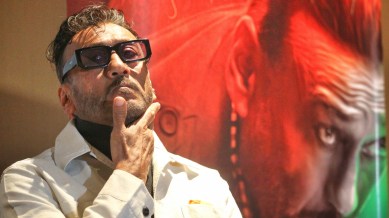Stay updated with the latest - Click here to follow us on Instagram
Delhi HC protects personality rights of Jackie Shroff, restrains misuse of name, image, voice without consent
The Delhi High Court said that the unauthorised use of actor Jackie Shroff’s name, voice, image, likeness, mannerisms, gestures etc for commercial purposes ‘dilutes the brand equity painstakingly built’ by him over the years.

In an interim order passed recently, the Delhi High Court has protected the personality and publicity rights of actor Jackie Shroff while restraining various entities – e-commerce stores, AI chatbots, social media accounts etc – from misusing the actor’s name, image, voice, and likeness without his consent.
A single-judge bench of Justice Sanjeev Narula in its May 15 interim order said that the facts narrated in Shroff’s lawsuit “undoubtedly establish” the actor’s “status as a celebrity”.
“This status inherently grants the plaintiff certain rights over his personality and associated attributes,” the high court underscored.
The court in its order took note of Jackie Shroff’s appearance in over 220 films, multiple television shows and web series, his endorsement of a large variety of products and services and appearance in several advertisements. It also took note of his trademark registered for the term ‘Bhidu’.
“The plaintiff’s (Shroff) commercial endorsements leverage his personality, name, voice, image, likeness, mannerisms, gestures, and other uniquely identifiable characteristics associated with him. These attributes, over which the plaintiff exercises exclusive control, constitute his ‘personality rights’ and ‘publicity rights.’ The unauthorized use of these characteristics for commercial purposes not only infringes upon these rights but also dilutes the brand equity painstakingly built by the plaintiff over the years,” the high court observed.
The defendant entities included e-commerce stores selling merchandise such as posters, mugs and T-shirts using the actor’s image, AI chatbots etc.
The high court thereafter issued notices to the various defendant entities and said that till the next date of hearing, they are restrained from infringing the personality rights of the actor.
‘Tribute to Shroff’s assertive demeanour’: HC on YouTube video
Additionally, the high court also reviewed a YouTube video by a content creator compiling various interviews of Shroff, highlighting his responses, followed by a pause in the video, during which the actor’s face is prominently displayed with a photoshopped gold chain, sunglasses, and the caption ‘Thug Life’.
On the term ‘Thug Life’, the high court said that it has been explained on dictionary.com as a slang term and defined as “Especially in Black hip-hop culture, thug life refers to a determined and resilient attitude to succeed in life in spite of racism and injustice”.
“A basic search on the internet would reveal that the term ‘Thug Life’ is commonly used in rap music, social media, and youth slang to denote a tough, resourceful persona. The term is often featured in memes that portray individuals demonstrating boldness or audacity, always with an undertone of humour or defiance. The phrase is employed to highlight moments of cleverness or resistance, framing the individual as admirable rather than nefarious. In fact, a search of the term ‘thug life’ on YouTube would bring results of various such videos which prima facie indicate that the term is meant as a compliment and not a derogatory word. Given this understanding of the term, the video in question could arguably be viewed as a tribute to Mr Shroff’s assertive demeanour. The video compiles publicly available interview clips where Mr Shroff is portrayed with forthrightness and wit. The additions made by the creator— such as the ‘Thug Life’ caption and accompanying visual embellishments— are intended to underscore Mr Shroff’s charismatic and assertive persona, aligning with the meme culture’s characteristic celebration of such traits,” the high court observed.
It said that the portrayal of the actor in the video does not introduce any falsehoods; rather, it “embellishes the existing public perception of Mr Shroff as a formidable and commendable figure”.
The high court also observed that YouTubers are a “growing community” and the substantial viewership of these videos translates into “significant revenue for the creators”. This, the high court, said underscores that such content is “not merely entertainment” but also a vital source of livelihood for a considerable segment, “particularly, the youth”.
Justice Narula said that these videos represent a form of artistic expression that requires creators to engage thoughtfully with their content, and restricting such creative expression could have far-reaching consequences.
“More critically it could set a precedent that stifles freedom of expression, potentially deterring the public from exercising their right to free speech due to fear of legal repercussions,” the high court underscored. The high court said that it wants to hear the defendant content creator, adding that “at this stage” it is not inclined to order a “prima facie interim injunction” against the person.